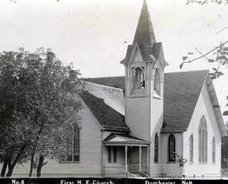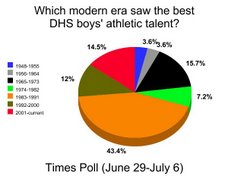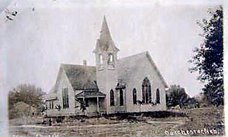The following post ran in the Dorchester Times 12 years ago.
In March 2008, America was entering the "Great Recession," Dorchester was preparing to tear down its 1920s school building in order to build the current structure, and Dorchester Times readers were demanding a town vote on whether to expand paved street in our village.
Today, let's take another look at what we were saying a dozen years ago:
***
 Recently, there has been increased chatter from Dorchester residents who want village leaders to seriously consider a plan to pave Dorchester's streets. Last weekend, the nine staff members of the Dorchester Times voted unanimously to support efforts to pave the majority of the town's streets.
Recently, there has been increased chatter from Dorchester residents who want village leaders to seriously consider a plan to pave Dorchester's streets. Last weekend, the nine staff members of the Dorchester Times voted unanimously to support efforts to pave the majority of the town's streets.
With paved streets will come new home construction; more home improvements; increased property value; less damage to vehicles; better air quality; less money spent on gravel and city employee labor; renewed community pride; and a better quality of life in general.
Supporting paved streets is the easy call. Finding the means to pay for them is a much more difficult task.
Supporting paved streets is the easy call. Finding the means to pay for them is a much more difficult task.
We decided to explore the methods of revenue collection used by communities currently paying for new paving projects. We found a variety of approaches.
The City of Lincoln, for example, relies heavily upon "impact fees" that are applied to new homes built in the city's outer limits. Back in 2003, former Lincoln Mayor Don Wesely used a bumpy, dusty gravel road as a backdrop to defend the Capital City's use of the controversial impact fees. Wesely called gravel roads an eyesore and said that an unpaved road is "less safe than a paved road, dusty, a daily problem for the residents ... and the wrong way to build a community."
Smaller communities -- those closer in size to Dorchester -- have similar impact fees. Ceresco has a water and sewer development fee of $2,250 per lot. Malcolm has a tap fee for sewer and water of $250 per lot, plus a sewer and water fee of $2,250 per lot. These fees are used, at least in part, for road improvements.
Of course, Dorchester doesn't have a boom in new home building -- not yet, anyway. Considering that about 75 percent of Dorchester's streets are unpaved, Dorchester would likely need to utilize a bonding program.
Many cities taking on new paving projects have residents vote on a bond issue, typically paid for by an increase in property tax. In the examples the Times found, senior citizens were often exempt from the property tax increase if they are at least 62 years old in the tax year. Most bonding programs also exempt the disabled.
There were some more creative and affordable ways of accomplishing the paving mission. Some communities held special fundraising drives to offset the overall cost. One community even found "sponsors" who donated substantial sums and renamed streets after the largest donors.
We also found one story from rural Washington state in which a small community paved all of its graveled streets thanks to a state grant and donated labor and machinery from a heavy equipment operation school.
The city of Kittitas, Wash. found a team of heavy equipment operators who donated their time, supervision, heavy equipment and the labor in the street paving project. The benefit for the school is that students and others in the program received on-the-job training in an actual project. Washington's state government granted Kittitas $112,644 for paving several streets within the city in the cooperative program. The state funding came from revenue generated by the statewide gas tax, which is similar to Nebraska's gas tax formula. (A portion of Nebraska's gas tax is dedicated to counties and local governments for road projects.)
Regardless of where you stand on the question of whether to pave Dorchester's streets, we can all agree it's hard to envision a wave of new houses or renovations without first seeing concrete trucks in our town.
Regardless of where you stand on the question of whether to pave Dorchester's streets, we can all agree it's hard to envision a wave of new houses or renovations without first seeing concrete trucks in our town.


















































Nice article, but I believe the name is spelled Wesley.
ReplyDeleteThe spelling of former Mayor Wesely's name was taken directly from a 2003 press release from the Lincoln Mayor's Office.
ReplyDeleteCorrection accepted!
ReplyDeletehttp://www.lincoln.ne.gov/city/mayor/pstmayor/wesely.htm
It would be nice, but my taxes are high enough from the school. I would rather have a new school than paving, Id rather better the kids, then have paving. People move to dorchester, because its closer to the bigger cities, most people I know dont complain. If there was someway to do it, and not tax us to the death, Iam all for it, but I dont see it happening.
ReplyDeletesounds to me the staff of the dorchester times has all the answers. too bad they won't even make their idenity known. but then if my ideas were as bad as the times staff are, i'd keep my idenity secret also.
ReplyDelete"With paved streets will come new home construction; more home improvements; increased property value; less damage to vehicles; better air quality; less money spent on gravel and city employee labor; a renewal of community pride; and a better quality of life in general."
ReplyDeleteAmen, brothers and sisters. Count me as a ditto head in this case.
If the town keeps getting run down as it is doing now then it won't be long before the new school follows suit. You need to fill the school with kids who care and we are getting more and more who don't. Look what they do to the park. There are millions of dollars in grants out there to help pay for improvements. The town just needs go get some of it.
ReplyDeleteThere is plenty of new construction, and house that have been bought and sold. They would of been sold with or without paving, paving will not better the town, new business and cleaning it up will do the best for dorchester, lets clean up main street, and make it look attractive, that would better the town, then work on the paving.
ReplyDeleteI agree that we do need to pave the streets, but has anyone looked at the water pressure that we have in town? You can't even flush the toilet and run the washer at the same time. Shouldn't we be looking under the streets before we cover them up with concrete?
ReplyDeleteThere has to be a grant or grants somewhere to get the ball at least rolling. I am sure that there is someone in Dorchester that knows how to write a grant. If not, make a little sign up sheet for volunteers to take a grant writing class.
Look who's criticizing the Times staff for not making their identity known, Mr/Ms Anonymous. If you spent 1/2 the energy being positive as you do being negative you could make a real difference in this community. Push ahead Times there are many of us who support paving & a housing development but just aren't loud & abnoxious. We're saving our strength for the work ahead.
ReplyDeleteMany good ideas here to fund paving, but I have one issue to "complain" about. What about those people who have paved streets already? They had the cost of the paving assessed against their property. In other words, the property owners paid for the paving.
ReplyDeleteThis is the most common form of paving funding, and the most fair. There is a reason that Dorhcester does not have more paved streets, because the adjacent property owners cannot, or do not want to afford it. How would you like to be on Social Security and end up loosing your home because you were forced to pave your street? Historically, that has been the issue in Dorchester.
Now I do not live there anymore, but those few streets that are paved, came at some heartache to the adjacent property owners. Now to have them pay for the rest of towns paving isn't really fair to them now is it?
Your dealing with dynamics here that are the underlying problem why more streets are not paved.
What needs to be done, is establish a long term plan where a street or two is paved every five years or so. Then the cost, and the bonds can be floated over a longer period of time. That is what most villages do. Maybe that could be sold to those who are already overburdened!!
Aren't all property owners paying for the $70,000 that the city budgeted for maintenance of streets last year? Aren't we supposed to give city residents the best bang for their buck?
ReplyDeletethe water system was updated just a few years ago for a cost of around 500,000. In many instances the cause of low water pressure is the lines inside the house.
ReplyDeleteIf the house has galvanized pipes, the pipes are probably plugged.
Have your plumber check your pipes, might not be the cities problem after all
It is the owner's responsibility for the low pressure, I'm not so sure of that, but what about the quality of the water that we are drinking every day. I received the little card telling me that our water in Dorchester has problems. Has anything changed on that aspect? Or should I continue to worry about the water that my kids drink everyday.
ReplyDeleteRegarding the quality of Dorchester's water, I can tell you it is about as good as you'll get in the western world. The notice you received deals with naturally occurring elements in our underground water sources.
ReplyDeleteYou could move to the U.S. southwest, where they have high levels of arsenic in their water. You could move to the East Coast, where there are high levels of hormones and prescription drugs in their water. You could move to California, where they have even higher amounts of pesticide in their water. The fact that most of our state's water comes from underground gives you a precious resource that most the world doesn't have. In fact, 66% of the world suffers from contaminated or poor quality water. Your kids are going to be fine. You should be more concerned about the soda pop and hypervenilating you expose them to.
Why is our Post Office listed 4 sale? New Pony Express era?
ReplyDelete